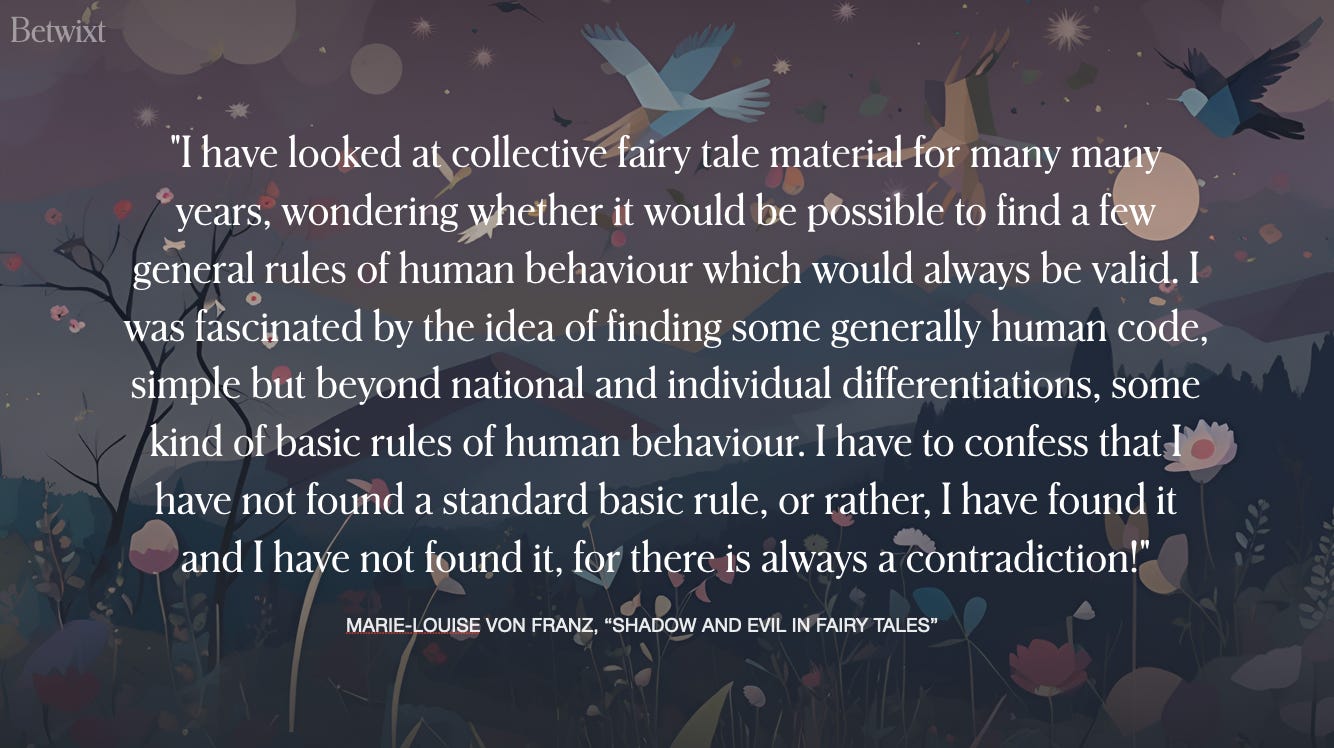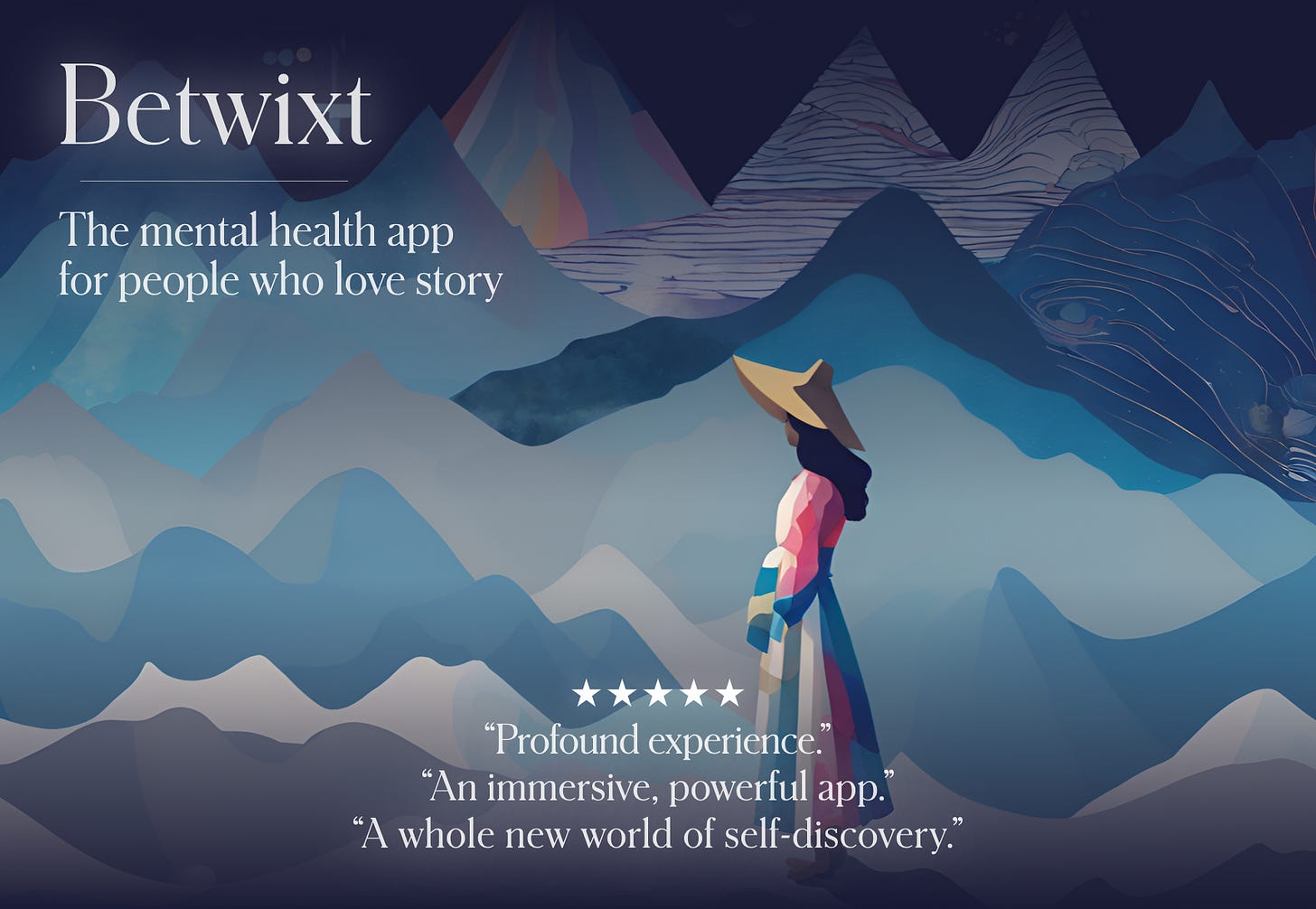Five simple ways to listen to your gut instinct
This is the one and only universal psychological truth
You can listen to this post on TikTok, YouTube or Instagram.
***
Ever wondered what the fairy tales and folklore that you've been absorbing since day dot are trying to teach your mind? Lots of things, actually, but there is only one consistent, universal message. This is it.
It’s generally accepted that we can look to myth, religious stories and any other kind of narrative for evidence of what humans believe (and have always believed) to be morally right and wrong. Story is – and has always been – how we communicate, process and remember such codes of conduct.
So, shouldn’t this mean that we can analyse those stories and come out with a kind of universal checklist of dos and don'ts for being a good human? Apparently not.
Marie-Louise von Franz, Jungian analyst and expert in the symbology of fairy tales writes in “Shadow and Evil in Fairy Tales”:
“I have looked at collective fairy tale material for many many years, wondering whether it would be possible to find a few general rules of human behaviour which would always be valid. I was fascinated by the idea of finding some generally human code, simple but beyond national and individual differentiations, some kind of basic rules of human behaviour. I have to confess that I have not found a standard basic rule, or rather, I have found it and I have not found it, for there is always a contradiction!”
– Marie-Louise von Franz, "Shadow and Evil in Fairy Tales"
The contradiction to that rule, by the way, is that there is one rule. And it’s kinda beautiful.
The one thing that seems to be true in every story from every culture is that the protagonist must never hurt or ignore the helpful animal in a fairy tale. Von Franz writes that she's found a few cases where disobedience leads to trouble but not disaster, as long as it's only temporary, but if you go against the advice of a helpful fox or wolf or cat or bird, if you don't listen, then you're done for. In the hundreds of stories she's analysed, this is the one rule that seems to have no exception.
"This would mean that obedience to one’s most basic inner being, one’s instinctual inner being, is the one thing which is more essential than anything else. In all nations and all fairytale material I have never found a different statement.”
– Marie-Luise von Franz, "Shadow and Evil in Fairy Tales"
But what does it mean? It means that the one thing we must always, always listen to is our most basic inner being – our instinct, our intuition. Our gut.
Of course, no one's claiming that this is easy. If it were, we wouldn't need to keep telling stories with that message, over and over again, for millennia.
Learning to listen to your gut
That said, we do all have this guiding voice, our inner compass. But in a world clamouring with noise and distraction, how do we learn to feel and trust it?
First, we must cultivate stillness. Create moments of silence each day, whether through meditation, writing, a walk in nature, or just being alone. And in those moments, be open to what occurs to you. Get curious about those thoughts that only show up when you're moving your body or sitting in the bath.
Next, make a commitment to honour the wisdom and experience of your physical body. Emotions are physical experiences – that's why they're called feelings – and you can think of them as direct communication from your unconscious mind. We learn, in this world, to brush these things off, and in doing so, we lose touch with our gut instinct. So, pay gentle attention to physical sensations like a tightening chest or a fluttering stomach. But don't be tempted to try to interpret their meaning, because when you're ready for that, it will come without being forced or sought. In the meantime, just notice what your body feels.
Next, practise discernment. This one is so hard for me, but intuition is patient, not impulsive. So, where possible, when making decisions, pause and sit with the feeling of making that choice, whatever it is. Ask yourself questions like "What feels right in my bones?" All of our language around intuition – gut instinct, felt sense, bodily knowing, feeling things in our bones uses physical language, because that's what it is – if you're in your head, trying to work it out, you're not there.
When you do listen to your body while making choices, pay particular attention to the subtle feeling of something being right. Eugine Genglin, the psychotherapist who developed the Felt Sense method talks about this as a gentle feeling of inner release that feels good even when the decision we arrive at is painful or difficult for us.
Finally, take some time to get to know yourself. It doesn't matter whether you do this in therapy, with journaling, shadow-work, creativity, or whatever. The more you align with your true self – the better you know who you really are – the clearer your intuition will become.
And what happens if you don't?
Finally, I have a question for you to answer, which might help with your motivation to take this advice if you're not yet sold. Try it on for size:
If there were a time in your life when you had that nudge of a gut instinct, but didn't listen to it for whatever reason, when would that be? And what happened?
I'd love to hear your answers to that question in the comments.
Thank you for reading!
We’re Hazel (ex boxer, therapist and author) and Ellie (ex psychology science writer). We left our jobs to build an interactive narrative app for self-awareness and emotion regulation (Betwixt), which you can try on Android here and on iOS here.








Thank you for your guidance, I will learn from you. 🤗
The body doesn't lie. I think once we learn to accept and honor this Universal truth life will, to some degree, get easier.